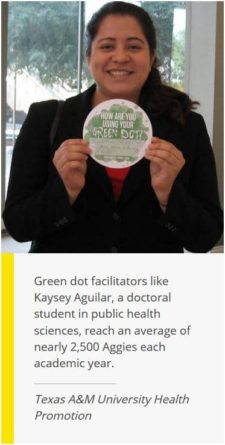Junior cadet Amanda Lovitt says she enjoys the opportunity to inspire other young women to achieve their goals.

Interview with Amanda Lovitt: https://www.youtube.com/watch?v=5BcAhldW3rQ
The Fightin’ Texas Aggie Band at Texas A&M University has welcomed its first female bass drummer to its ranks, Amanda Lovitt ’23, a junior cadet and engineering major from Plano, Texas.
A member of the Corps of Cadets’ A-Battery, Lovitt set her sights on becoming a bass drummer very early on in her Corps career. She said Corps leadership looks for both moral character and physical ability in a bass drummer.
“We are supposed to represent the ‘Noble Men of Kyle’ which means you have to be someone of high moral character that embodies all of the core values of the Corps of Cadets,” Lovitt said. “They don’t tell us explicitly, but they start watching us during our fish (freshman) year for a spot with the bass drummers.
“At the start of sophomore year, they really start looking at how involved you are. Do you stay late after practice? Do you go to extra practices in your free time? All of these aspects are what they consider, among other things. Of course there are physical drumming tryouts where you learn the basics of playing the instrument, but they really look at what kind of person you are.”
After two years, her hard work and determination had finally paid off. She was selected to be one of the Fightin’ Texas Aggie Band’s newest bass drummers, an honor only given to juniors in the band.
“When I found out that I had been selected, I was on cloud nine,” she said. “In the months following, I would randomly think about it and just immediately have the biggest smile on my face. Being a bass drummer is something only juniors are allowed to do. Juniors have the experience, we know the ropes, and we are comfortable with playing such a large instrument. Seniors often want to use their final year to relax and play something more specific to what they like. It’s a demanding job.”
Then, unbeknownst to Lovitt at the time of her audition, she discovered another important piece of information about a newly earned title: the first female in band history to be named a bass drummer.
“Going into bass drum tryouts, I had no idea that being the first female bass drummer would even be a possibility,” she said. “It was just something I was going out for because it was something that I wanted. It wasn’t until after I made it that a former cadet called me to congratulate me on being the first female. It wasn’t something that I had even considered when trying out, but it was definitely something that made me surprised and excited when I did.”
Lovitt said she hopes her success with the band helps inspire other young women.
“With this platform, I would like to be able to motivate others,” she said. “I want to see other young women and tell them that nothing can stop them from achieving their goals. You are the only thing that stands in your way of success, and I want to be able to show young girls that in this position.”
Lovitt said she’s already beginning to see how the ripples of her success are being cast out to other young women.
“At Midnight Yell, I actually had a gentleman come up to me and ask if I was the first female bass drum player,” she said. “When I told him that I was, he began telling me about how I’m his young daughter’s biggest inspiration. For me, that broke my heart in the very best way. That is what being in this position is all about. It is all about inspiring others.”
She shares the following advice for all women looking to break into predominantly male fields:
“Don’t let anyone get you down, including yourself,” she said. “A lot of times, we are our own worst enemy. This can sometimes be multiplied by 10 when you’re around men, even if they don’t mean it. Sometimes you can be seen differently just for being a woman, which can be hard to take. Don’t let that get to you, and don’t be afraid to stand up and say ‘this is me and I’m here to stay.’”
Along the way, there have been a number of people who have inspired Lovitt, she said, among them family members, friends, and her fellow Aggie band members. But one in particular stands out.
“Nick Rossi, the band commander when I was a freshman, actually sat down with me and had a few conversations with me at different times,” Lovitt said. “He seemed like one of those people that I would never speak to as a fish since he was a senior, but he was so inspiring and he really changed the way I think. He motivated me to be a better cadet and to be a better band member. He had that leader mindset that brought me up to his level.”Lovitt said she’s ready to perform, inspire and leave her mark on Aggie history.
“When I march, everything else disappears. I go into my own little world,” she said. “The band is my escape. Nothing in the outside world matters to me when I am performing. I may be the first female, but I know I won’t be the last. I hope there are many, many more to come after me. I’m very excited about that.”
See original article at Aggie Band’s First Female Bass Drummer Talks About Demands, Honor Of The Job – Texas A&M Today


